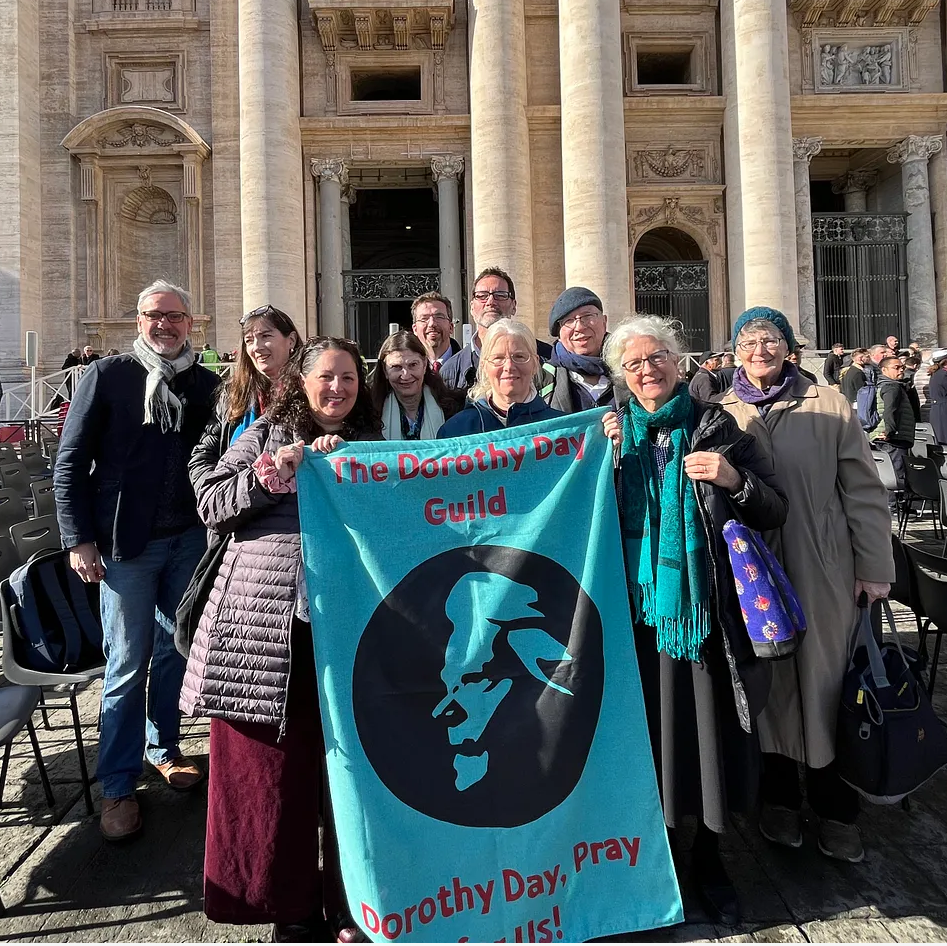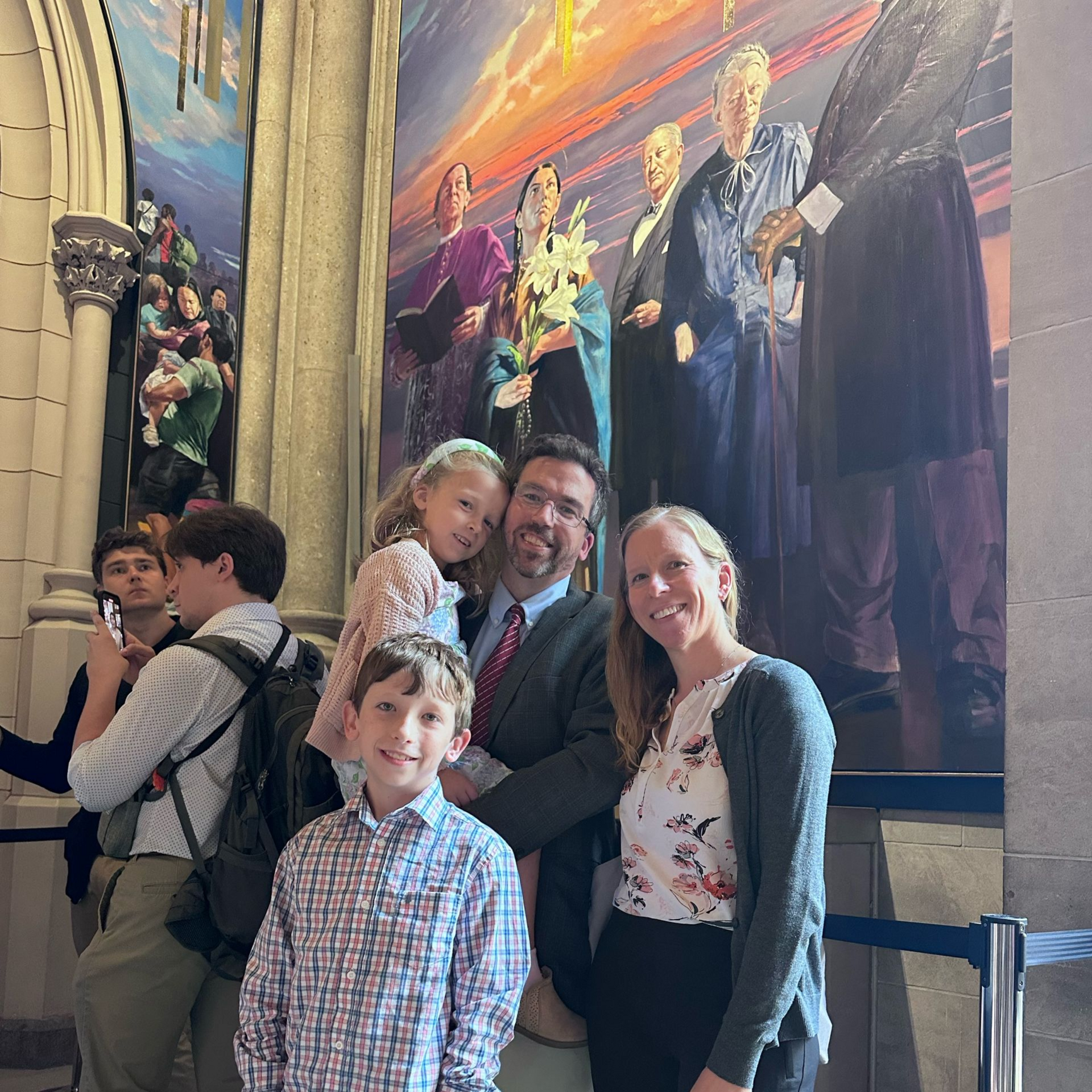"The Spirit Accomplished Something Extraordinary"
Dear friends and members of the Dorothy Day Guild,
Happy Pentecost! On this feast, when we celebrate the coming of the Holy Spirit upon the apostles in Jerusalem, we thank God for the ways in which that same Spirit is alive and well in the Church today. We see the Spirit’s presence in those who like Dorothy, and who like so many of you, have dedicated their lives to working for peace, living in solidarity with the poor, and to offering the works of mercy to those most in need.
The feast of Pentecost also marks the end of the Easter season and is therefore a particularly special time for the newest members of the Church all around the world, who received the sacraments of initiation at the Easter Vigil and those who were even more recently sealed with the gift of the Holy Spirit at their confirmations. Dorothy herself was confirmed at Pentecost in the spring of 1928, a day she remembered in The Long Loneliness as “a joyous affair.”
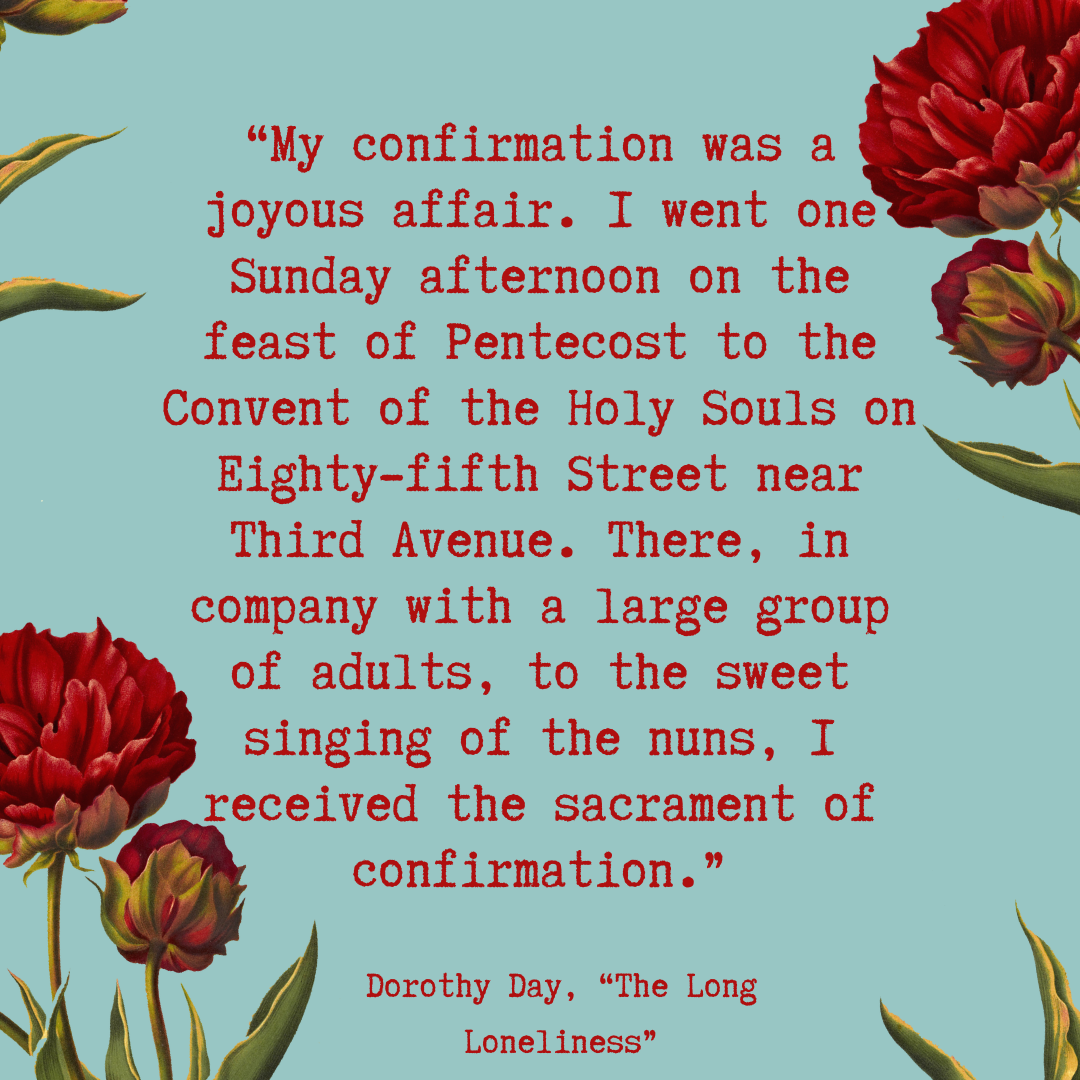
As we re-enter the season of Ordinary Time, please join all of us at the Guild in praying for those who were received into the Church this Easter season and in asking the Holy Spirit to enlighten and guide them in their journeys of faith.
Summer Reading Opportunities:
Our online reading groups have been so popular during Lent and the fall semester that we’ve decided to offer TWO summer book clubs this year! Our summer book clubs will be led by our former and current Dorothy Day Graduate Research Fellows, Graceann Beckett and Magdalena Muñoz Pizzulic.
The first book group, led by Graceann Beckett, will be reading and discussing
The Long Loneliness over the course of six Sunday evenings, beginning on Sunday, June 29th from 8:00- 9:00 PM Eastern and continuing each week through Sunday, August 3rd.
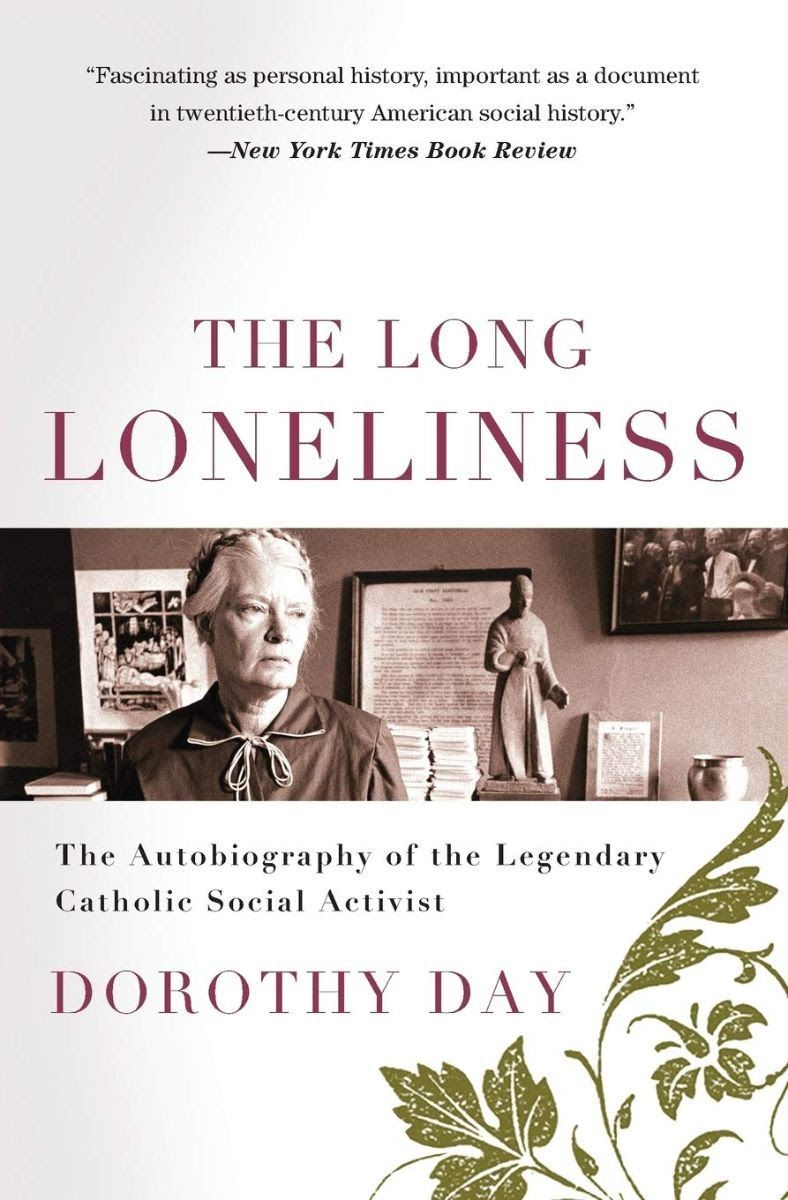
Each of these sessions will begin with prayer and will include context and background material to help participants enter more deeply into the relationships, texts, and historical moments which shaped Dorothy as well as plenty of time for questions and open conversation.
The Long Loneliness is a modern spiritual classic: whether this summer is the first time you’ve picked it up, or you’ve returned to this book many times over the years, you are sure to walk away from this reading with new insights. To sign up for this book club, please register using this form.
Additionally, we are especially happy to announce that Magdalena will be leading the Guild’s first-ever Spanish language reading group this summer! This group will be gathering over the course of four sessions to read Mi conversión: De Union Square a Roma (From Union Square to Rome), Dorothy’s first autobiography. In this book, written as a letter addressed to her brother, Dorothy narrates in depth her experience of conversion from secular left-wing activism to Catholicism, the intellectual influences that have shaped her thinking, and the permanent religious experience that lead her to continue her radical commitments while simultaneously embracing the Catholic faith.
This reading group, which will meet Tuesday evenings from 7:00- 8:00 PM Eastern on July 8th, 15th, 29th, and August 5th, will provide a space for shared reading and reflection and and opportunity for participants to learn more about Dorothy, her motivations, and what inspires her radical option in the Church, particularly in the Latin American context.
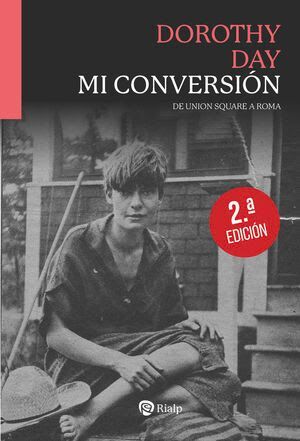
While the readings, presentations, and book discussion will all be offered in Spanish, you are not required to be a fluent speaker in order to sign up! Spanish language learners at all levels are welcome to follow along with the readings, listen, and participate in conversation as they are able. This is a wonderful opportunity to connect with activists, seekers, and members of our global Church who are interested in Dorothy’s life and legacy, and practice language skills at the same time. To register for the Spanish language book club and read Mi conversión: De Union Square a Roma, please use this form.
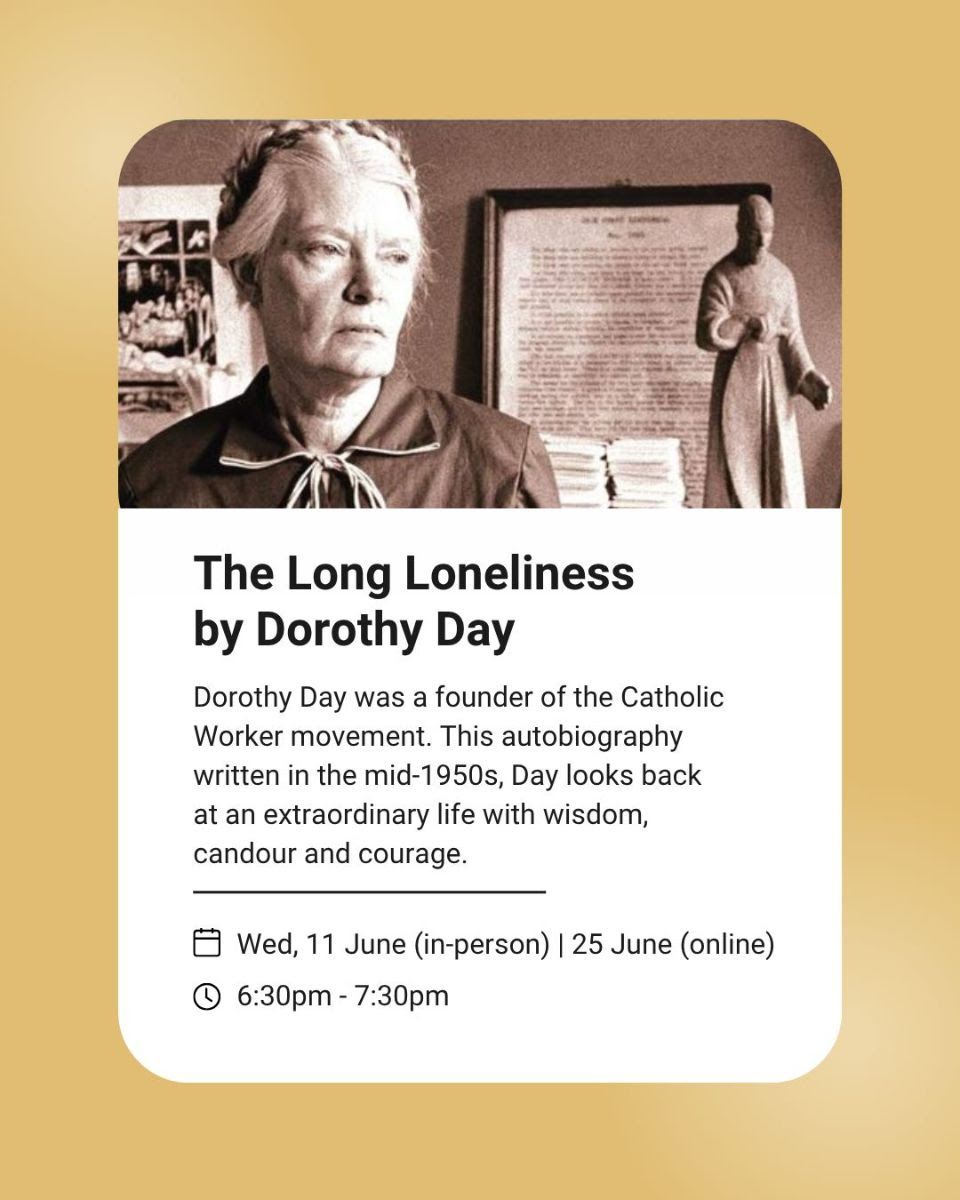
For those in the United Kingdom, the London Jesuit Centre has also chosen The Long Loneliness as the June pick for their monthly book club. This reading group offers monthly sessions, both in-person and online, and covers a single book in one meeting. If you’re in London, you can sign up for the in-person session, which will take place on Wednesday, June 11th, from 6:30-7:30 PM at 114 Mount Street.
The Centre is also offering an online session of the same group on Wednesday, June 25th, from 6:00-7:00 PM (1:00-2:00 PM Eastern) Both June sessions will be guided by Dr. Aidan Cottrell-Boyce and will include book discussion and faith-sharing.
Retreats, Pilgrimages, and Prayer:
We are excited to be offering SIX walking pilgrimages in Manhattan this summer, the first of which is coming up on June 29th. All of our pilgrimages will take place on Sunday afternoons from 2:00-4:30 PM. These free events are a great way to immerse yourself in the places, communities, and experiences which shaped Dorothy as a young mother and journalist in New York through the publication of the first issue of The Catholic Worker and into the present witness of the Catholic Worker houses of hospitality where Dorothy spent the last decades of her life. Sign up here to take part in one of these special pilgrimages (and invite your friends to come, too!).
There is still time to register for the Dorothy Day Retreat at Pyramid Life Center next month, which will take place from Monday, July 21st to Wednesday, July 23rd. Martha Hennessy and Fred Boehrer will be co-facilitating this retreat using Robert Ellsberg’s Dorothy Day: Spiritual Writings as a guide to reflect on how Catholics in the United States can live out their baptismal vocation in the present moment. Dorothy’s spirituality grounded and enlivened her activism, her voluntary poverty, and her pacifism; perhaps the Holy Spirit is calling you to something similar. We highly encourage you to sign up for this incredible opportunity for prayer, contemplation, and conversation accompanied by two wonderful retreat leaders, each of whom is living out their vocation within the Catholic Worker movement and in their families.
Finally, we would like to share a prayer written by Cheryl Anne Maris, a member of the Order of Berrigan and Day, which was officially inaugurated last month on May 1st, the 92nd anniversary of the founding of the Catholic Worker movement by members of the parish of St. Mary of Bethany, an ecumenical Christian community in Nashville, TN. Members of the order, which is open to those in the Nashville area and further afield, make promises of welcoming, listening, and co-laboring as well as a financial commitment to supporting the corporal works of mercy.
The Chaplet of Berrigan and Day, which is designed to be used with Anglican prayer beads (similar to a rosary), is a contemplative prayer based on the Gospel as reflected in the lives and work of Dorothy and Fr. Dan Berrigan. It is amazing to see how Dorothy’s legacy of nonviolence, voluntary poverty, and hospitality is inspiring our brothers and sisters from other faith traditions and denominations!
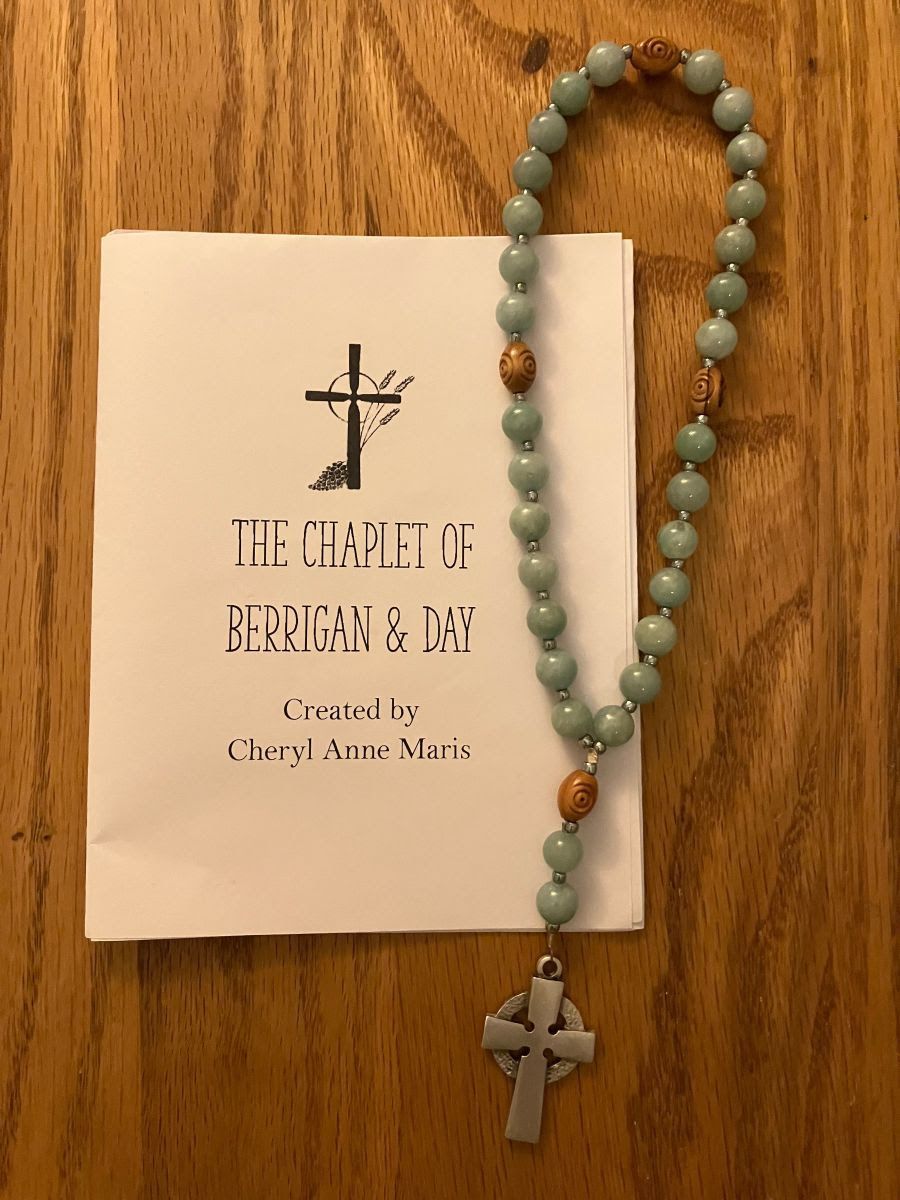
Other events!
We have two additional events/resources to share with you this month. The first is just a brief note that the recording of Robert Ellsberg’s March 31st Lenten Lecture, “The Long Pilgrimage of Dorothy Day,” is now available on our Youtube channel. If you haven’t gotten a chance to view this talk yet, we encourage you to check it out!
We would also like to draw your attention to another online formation opportunity, this one specifically for college students. The Dorothy Day Center at Manhattan University is partnering with Pax Romana International Movement of Catholic Students to offer a five-session training, “Living the Spirituality of Action.”
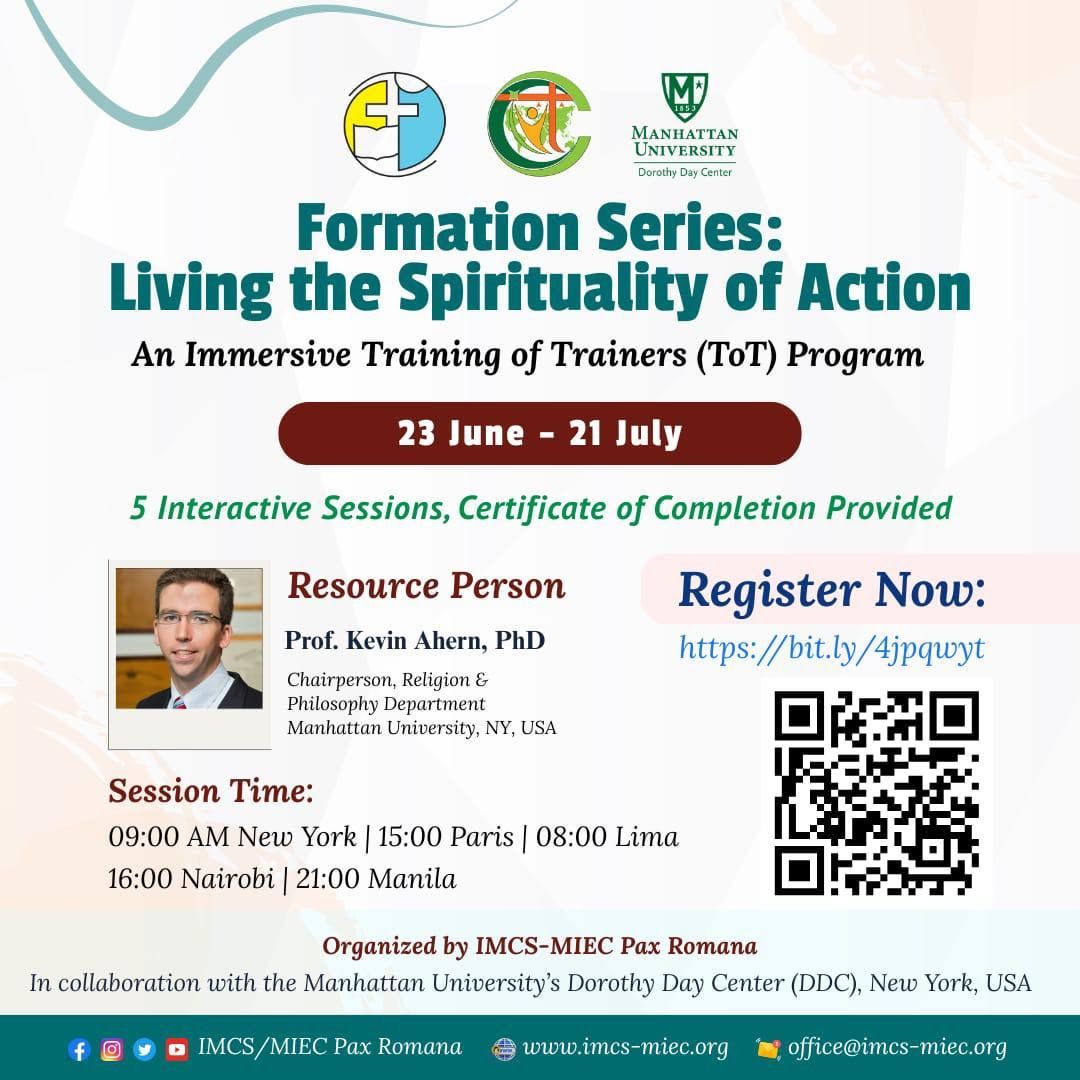
This formation series includes five interactive sessions from June 23rd-July 21st (9:00 AM Eastern), which will help participants deepen their understanding of Catholic Social Teaching, connect Gospel values with real-world justice issues, develop concrete, faith-based action plans, and build capacity to form others in a spirituality that acts. Our Dorothy Day Guild chair Dr. Kevin Ahern will serve as the resource person for this training.
If you are an undergraduate student, or you work with students who are interested in the Catholic social tradition, Dorothy’s spirituality and faith-based activism, and living out the Gospel as leaders in their communities, please sign up for or share this training opportunity with them! You can register for the “Living the Spirituality of Action” formation series using this form.
Dorothy in the News:
Back in October, we shared a notice on the publication of the latest book on American Catholic pacifism and active resistance to war, Michelle Nickerson’s Spiritual Criminals: How the Camden 28 Put the Vietnam War on Trial. Last month, for
Commonweal, Arvin Alaigh published “Resistance Revisited: Gaza and the legacy of the Catholic peace movement,” engaging that tradition, specifically the witness of the Camden 28 and other draft board raid participants from the 1960s and 1970s, to see how it shapes and forms the responses of contemporary Catholic peace activists to the genocide in Palestine.
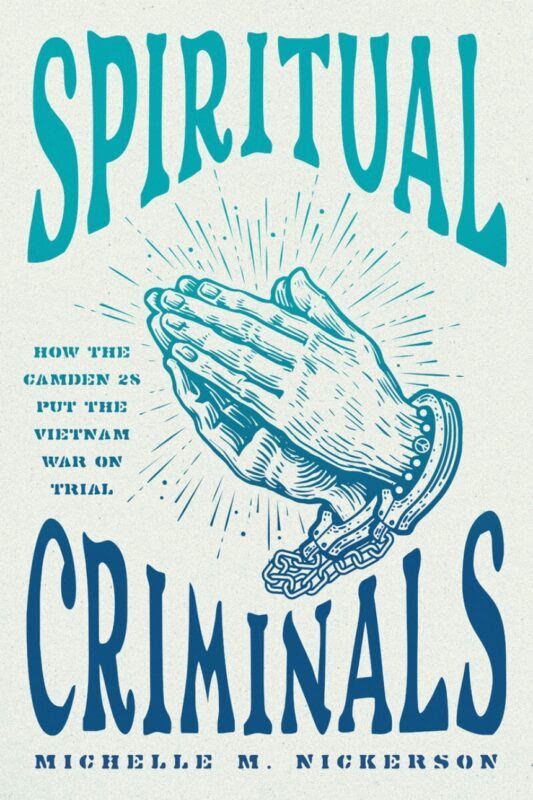
Writing on Catholic Worker Mark Colville’s response to the Israeli military’s routine practice of home demolitions in the West Bank, Alaigh notes,
“The moral witness and action of Colville, and the Catholic activists he joined, are modern incarnations of the rich American Catholic antiwar tradition. It’s a tradition that dates back nearly a century, inaugurated, it is generally agreed, by Dorothy Day. Her pacifist resistance during World War II drew the admiration of many, but the ire of more. She spent decades writing on the interwoven evils of war-making and poverty, excoriating an American political consensus that immiserated untold millions across the country and world every day.
By the 1960s, Day had grown into a movement elder and played a critical role in mentoring the next generation of Catholic peacemakers. The new class of activists directed their attention to the Vietnam War, ultimately coalescing around the Catholic Resistance, a loosely connected political formation that carried the American Catholic antiwar tradition to its zenith.”
Part in-depth review of Spiritual Criminals, part reflection on historiography and the demands of conscience, Alaigh’s article is our must-read for the month– and we’re looking forward to the forthcoming publication of his own book, Double Crossed, which places the Catholic Resistance during the Vietnam era in the broader context of Cold War politics, the antiwar movement, and the trial of the Harrisburg Seven, told through the lives of Daniel and Philip Berrigan.
We’d also like to offer our congratulations to our friends over at US Catholic, who are celebrating their 90th anniversary of publication this year. In honor of this milestone, the June 2025 issue of the magazine features a conversation with Claretian priests Mark Brummel and John Molyneux, each of whom previously served as editor-in-chief of US Catholic. In this interview, Father Brummel and Father Molyneux touch on the first stages of Dorothy’s cause for canonization, which was originally initiated by the Claretians prior to being officially transferred to Dorothy’s home diocese in New York. Fr. Brummel remembers the immediate groundswell of support for Dorothy’s cause as fascinating and notes that the magazine sponsored two seminars, at Marquette University and at the United Nations, on Dorothy’s life of heroic virtue in those early years.
All of us at the Guild would like to extend our deepest gratitude to the Claretians for their foresight in recognizing Dorothy’s holiness and our Church’s need for her prayers and example. To everyone at US Catholic, thank you for carrying forward Dorothy’s legacy of lay Catholic journalism, and congratulations on this amazing anniversary!
Finally, we’ve seen an increasing number of short articles on Dorothy in Spanish-language media from Latin America and Europe in recent months, most recently “Los descubrimientos de Dorothy Day” (“The Discoveries of Dorothy Day”), by Antonio R. Rubio Plo and “La santa feminista: la vida ejemplar de Dorothy Day,” (“The feminist saint: the exemplary life of Dorothy Day”), by Santiago Pérez.
Writing for the Madrid-based Catholic radio network COPE, Rubio Plo notes that From Union Square to Rome is atypical of conversion narratives in that rather than being characterized by overwhelming Divine activity, Dorothy’s first autobiography is instead organized by her own discoveries: that solidarity with the poor and the oppressed finds its most profound meaning in the Gospel, that love for God can be expressed in friendship, in the love of those close to us, and in the contemplation of the natural world, and above all, that we meet Christ in the poor. For La Diaria, an independent, progressive Uruguayan news outlet, Pérez highlights Dorothy’s lifelong pacifist commitments, her total opposition to war, and her prescient warning following the American bombings of Hiroshima and Nagasaki that the United States was becoming an increasingly militarized society, placing its faith in nuclear weapons instead of in God.
We’re delighted that Dorothy’s life and her legacy of nonviolence and solidarity with the poor are engaging new audiences in our global Church and in society at large! As we continue the work of translating Dorothy’s work into Spanish and other languages, all of us at the Guild look forward to building relationships with other Catholic, ecumenical, and activist communities who are promoting Dorothy’s unique mode of living out the Gospel in service of the common good.
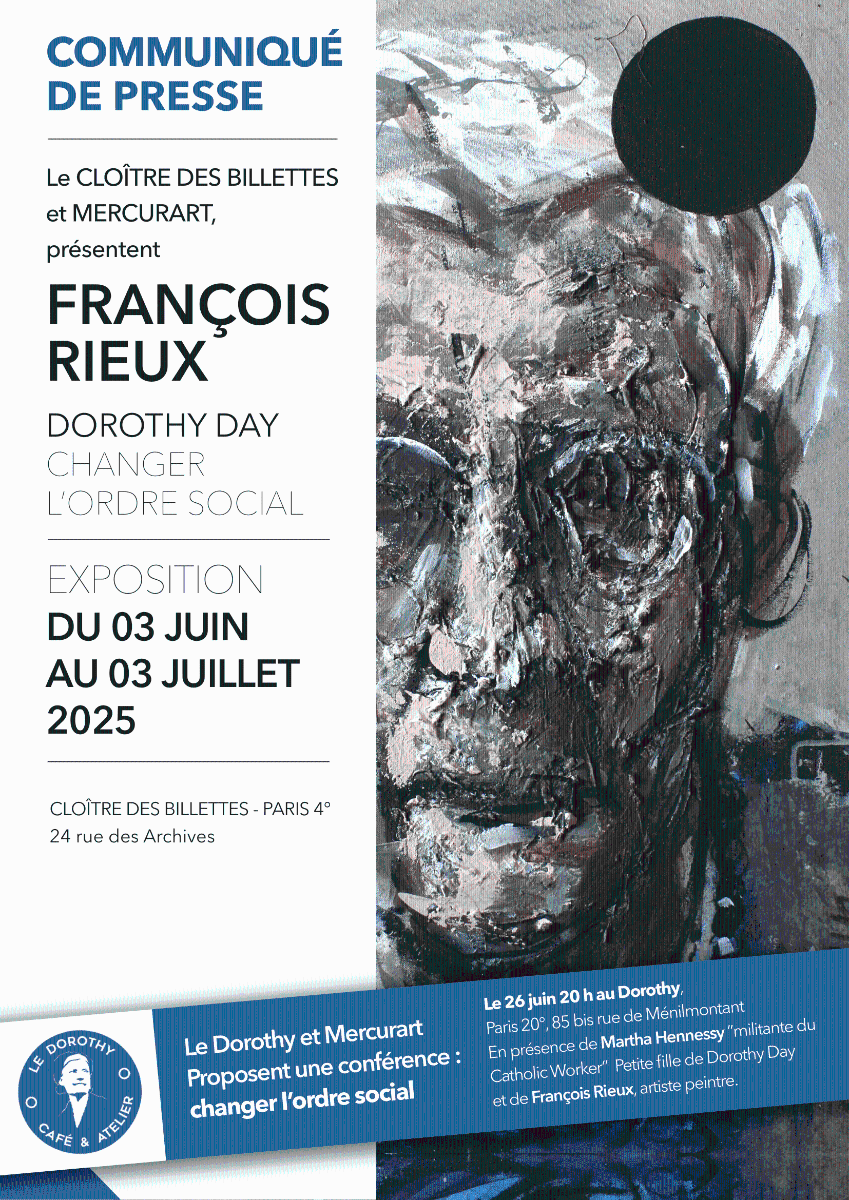
Art and Music:
For our friends in Europe, we would like to share some additional information about François Rieux’s new exhibit of expressionist paintings, entitled Dorothy Day: Changer l’Ordre Social, which opened last week and runs until the third of July at the Cloître des Billettes in Paris. In an article for
Roundtable, “Exploring the ‘Incandescence’ of Dorothy Day,” Jerry Windley-Daoust notes that with these paintings,
“Rieux attempted to capture Dorothy’s essence rather than her biography. He wanted his canvases to represent “the embodiment of a commitment, in all its fragility, light, and solitude.”
That commitment is powerfully embodied in the painting La Pacifiste (The Pacifist) based on the iconic photograph of Dorothy sitting on a folding chair, framed by the thighs of two police officers, at the 1973 United Farm Workers strike organized by Cesar Chavez.
The painting depicts Dorothy as a luminous figure dwarfed by the towering police officers. In the face of the dark fencing her in, [Jean-Claude Millet, founder of the Mercurart gallery and publishing house] says Dorothy is:
‘peaceful but firm, committed but confident […] willing to trade her physical freedom for her freedom to witness to what she has understood about Jesus. She draws from this a paroxysmal capacity for detachment, consubstantial with her conviction. She drank from the source that goes back to our origin: the source of Love that springs from where Man is.’”
Rieux’s paintings are accompanied by a book by the same title, also published in English as Dorothy Day: Changing the Social Order, a collaboration between Rieux and Millet. The book pairs reproductions of the paintings with reflections by friends and relatives who knew Dorothy during her life, including Martha Hennessy and Geoffrey Gneuhs, and a biographical sketch introducing Dorothy to a French-speaking audience, emphasizing her radical commitments and their relevance to our current moment.
As part of the celebration surrounding the exhibition, Martha will be speaking at a free event in Paris at Le Dorothy, a Catholic Worker-inspired community gathering space, at the end of this month. The community at Le Dorothy Café et Atelier would like to extend a warm invitation to everyone to join them for “La Petit-Fille de Dorothy, Au Dorothy!” (“Dorothy’s Granddaughter at the Dorothy!”) on Thursday, June 26th at 8:00 PM.
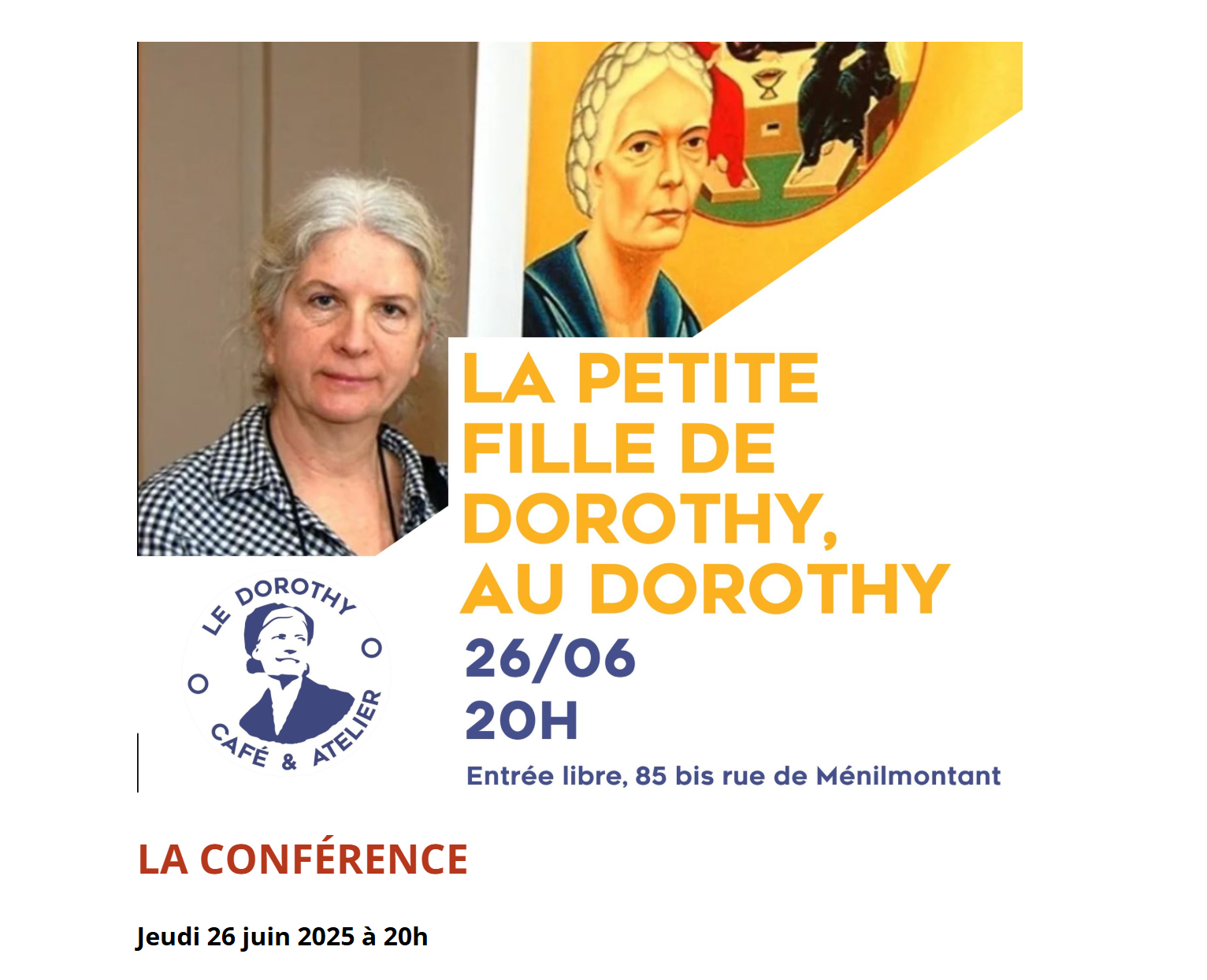
If you or someone you know will be in Paris this summer, we highly encourage you to attend Martha’s talk, visit Le Dorothy, or check out Dorothy Day: Changer l’Ordre Social at the Cloître des Billettes from now until July 3rd– and, to learn more about how the radical witness of Dorothy’s life and legacy inspired a group of young French Catholics who came of age during Pope Francis’ papacy to open a community café named in her honor, check out this recent article from Le Monde, “Génération François: portrait d’une jeunesse politisée avec le pape argentin, « un phare pour assumer ma radicalité »” (“Generation Francis: A portrait of youth politicized by the Argentinian pope, ‘a beacon for embracing my radicalism’”).
In other news, we were so excited to come across a new EP by the indie-folk band Los Gatitos, “The Ballad of Dorothy Day,” which was released on June 1st with a B-side track, “Nuclear Fear.” The lyrics are GREAT, and really fun to sing:
“Fly away cardinal, my money’s on the dove.
A house of hospitality; we can rise above,
The oppressors and possessors, gatekeepers and the creeps,
Disarm the hearts, burn the flags, our passion never sleeps.
Gonna work, work, work for the workers’ revolution,
Gonna fight, fight, fight for the fishes in the sea,
Gonna help, help, help the homeless and the hungry,
Gonna build a better world for you and me.”
I wrote to Lisa Marr, the lead singer for “Los Gatitos,” asking if she could share anything further about the inspiration for this new song– Lisa says,
“I first heard about Dorothy Day from my dear friend and wonderful writer Heather King who penned this column in the Angelus News back in 2015…
The story of this incredible woman stayed with me and I knew her life would make a terrific song... The first verse came to me in a flash and I carried it around in my head for some years before finishing it in January during a "song a day" challenge we were doing. Dorothy Day's wonderfully eventful and nuanced life of service is an endless inspiration to me and the band, especially during these tumultuous times. It's our hope to turn more people on to Dorothy's call to "disarm the heart" and get directly involved with making our communities more loving, equitable and empowered.”
Lisa also shared another one of their songs, “in the same spirit,” called "Doing It For Love." “The Ballad of Dorothy Day” is destined to become a Catholic Worker classic, but beyond that, cataloguing music like this and The Chairman Dances’ “Dorothy Day and Peter Maurin,” from their 2016 album, Time Without Measure is an important part of the Guild’s work!
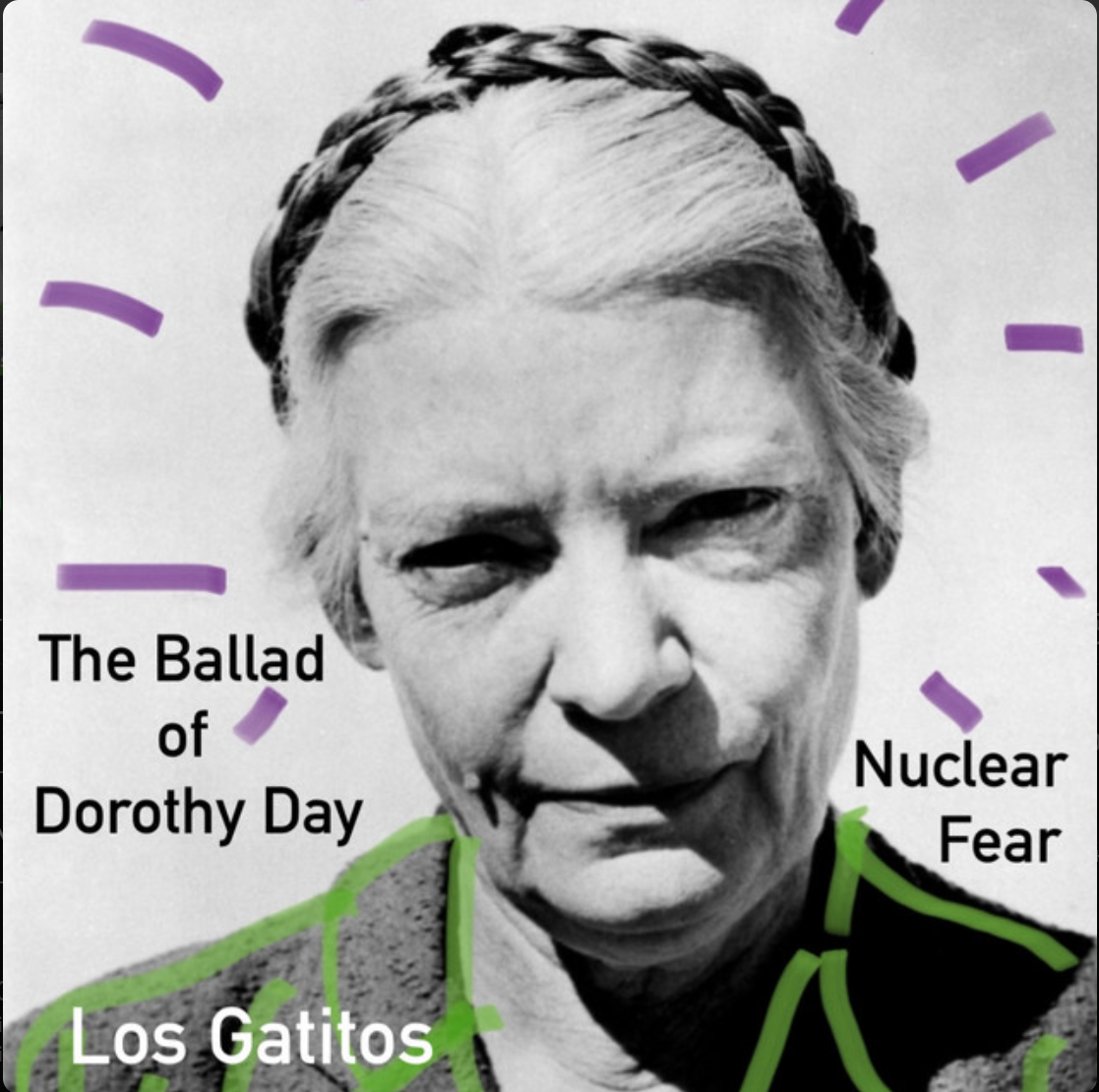
As a lay association of the faithful, the Dorothy Day Guild supports the work of our postulator, Dr. Waldery Hilgeman, and our relator, Monsignor Maurizio Tagliaferri and their team at the Vatican in part by gathering evidence of widespread devotion to Dorothy– which is another way to say that the faithful already understand her as a holy figure worthy of admiration and imitation. In fact, a CD of the song “Dorothy Day and Peter Maurin” was included in the evidence we sent to Rome at the close of the diocesan phase of Dorothy’s cause for canonization. If you are working on any kind of creative project, whether it is art, theater, music, or something else which similarly engages Dorothy’s life and her legacy, please contact us so we can share it with our colleagues at the Dicastery for Causes of the Saints and with our wider network of friends and supporters.
A few words from Dorothy:
Yesterday, our Guild social media feeds were filled with stunning images from the Pantheon in Rome, which was consecrated as the Basilica of St. Mary of the Martyrs in the year 609 AD. Each year on Pentecost, firefighters on the roof of the basilica drop thousands of red rose petals through the oculus, allowing them to rain down on the worshippers in imitation of the Holy Spirit’s descent upon the apostles as tongues of fire.
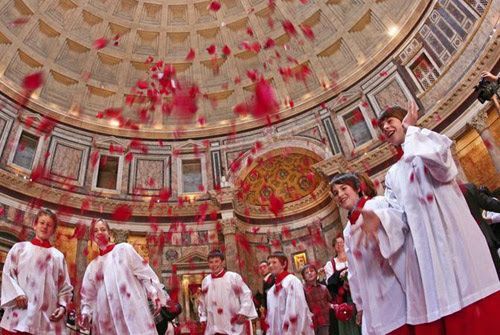
Dorothy never visited Rome during Pentecost, but she did experience a similarly beautiful liturgy during the season she spent living with her daughter Tamar Teresa in Mexico City. Dorothy and Tamar lived in Mexico City for six months in the winter and spring of 1930, while Dorothy worked as a freelance journalist for Catholic publications in the United States.
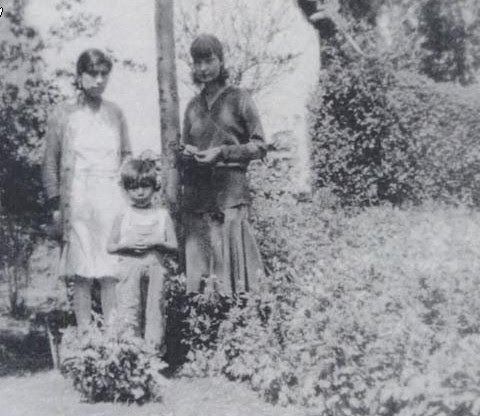
The lively mix of cultures, languages, and styles of Catholic worship in Mexico strongly affected Dorothy, who herself had been previously shaped by the Anglo-Protestant habits of her upbringing. Dorothy was deeply moved by the ardent faith and exuberant celebrations of the Indigenous Christians at the parish she attended, who centered their lives around acknowledging and giving thanks for God’s ongoing providence. For the July 1930 issue of Commonweal, Dorothy wrote that she and Tamar,
“had spent three hours on Good Friday in a sad gloomy church, and Easter Sunday we had attended the high Mass, which as I had expected, was nowhere near as glorious as that of Palm Sunday. And now it was Monday and the cobbled roads and paths across fields to the church were filled with gayly dressed Indians, children in pink and blue satin, the men in white cotton and linen colored blouses. All the seats in the church were taken and we had to find a place for ourselves on the floor as usual. In a few minutes, to gay and joyful music, the three priests came out in their white and gold robes, and showers of blossoms of all kinds began to float down through the church in steadily increasing density. The Mass was being said at the altar of the black Christ, blacker by far than any of the Indians in the congregation. During the Gloria in Excelsis little Indian boys appeared at windows high up above the altars, looking like cherubs painted there, and came to life to hurl down handfuls of roses and poppies which fell softly before the altar. The steady storm of blossoms was coming from five other apertures in the domes of the church.
For once Teresa was perfectly happy to sit through the long service. She got directly beneath the falling blossoms at the back of the church and she and a little Indian boy swept the petals around them into piles and tossed blossoms at each other gleefully. The music was very gay. There were violins, violas and flutes beside the organ, and I strongly suspect grand opera music was being played. Through all the Mass petals of carnations, violets, roses and poppies and shreds of calla lilies came floating through the air, falling on everyone, until the flowers were so heaped up around us, that there was actually a wet sound of falling petals.”
In a moment in the United States where we are seeing increasing hostility towards immigrants and their children, particularly those from Latin America, Dorothy’s columns from Mexico City, many of which have been collected in Commonweal, remind us of the reality that we are all members of the Body of Christ, intimately connected to one another in the Spirit. As Pope Leo said in his Pentecost homily yesterday,
“the Spirit accomplished something extraordinary in the lives of the Apostles. Following Jesus’ death, they had retreated behind closed doors, in fear and sadness…The Holy Spirit overcomes their fear, shatters their inner chains, heals their wounds, anoints them with strength and grants them the courage to go out to all and to proclaim God’s mighty works.
The reading from the Acts of the Apostles tells us that in Jerusalem at that time there was a multitude of people from various backgrounds, yet “each one heard them speaking in his own native tongue”. In a word, at Pentecost, the doors of the Upper Room were opened because the Spirit opens borders.”
The Holy Spirit, our teacher and our comforter, breaks down the barriers which divide us from one another. Pope Leo went on yesterday to remind us that,
“At Pentecost, the Apostles spoke the languages of those they met, and the confusion of Babel was finally resolved by the harmony brought about by the Spirit. Whenever God’s “breath” unites our hearts… differences no longer become an occasion for division and conflict but rather a shared patrimony from which we can all draw, and which sets us all on journey together, in fraternity.”
Dorothy never became a fluent Spanish speaker, but her time in Mexico left her with a lasting appreciation for the essential unity of the Church, a unity which was not shut away by locked doors or walled borders, but instead enlivened and enriched by the cultures, traditions, and peoples it encompassed. This month, please join us in asking Dorothy to pray alongside us for all migrants and refugees, especially those who are separated from their families and who are living in fear, and for the Holy Spirit to dwell in our Church and help us to recognize each other as brothers and sisters.
In peace,
Dr. Casey Mullaney, on behalf of the Dorothy Day Guild
Share this post
